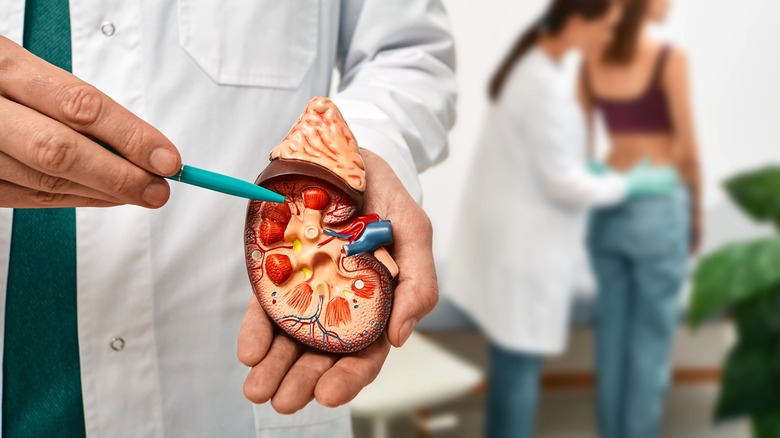What To Expect After Donating A Kidney
Donating a kidney is a big decision that has the potential to save someone's life. It is also a major surgery that requires a significant recovery period. If you donate a kidney, you will likely stay in the hospital for one to three days after surgery, during which time you will receive pain medication and other care as needed (via The National Kidney Foundation). You will also be closely monitored for any complications.
Once you are discharged from the hospital, you can expect to feel tired and have some pain and swelling around the incision site. It is important to take it easy and not lift anything heavy for at least six weeks after surgery. You will also need to see your doctor for follow-up appointments to make sure your incision is healing properly and there are no signs of infection or other problems. People who donate a kidney and subsequently only have one kidney are able to live normal, healthy lives after surgery. Donating a kidney is a big decision and a major surgery, but it can be a very rewarding experience. Knowing what to expect during and after the surgery can help you better prepare for the process and recover more quickly and smoothly.
What to know about kidney donations
There are many reasons why people may need a kidney transplant. Some underlying health conditions can cause kidney failure, while others may be born with renal defects that prevent proper kidney function. Kidney failure refers to the inability of the kidneys to filter waste and toxins from the blood, which can lead to a buildup of these substances in the body. This can cause serious health problems, including heart disease, stroke, and death without a kidney transplant (via The National Health Service).
Kidney transplantation is the only treatment option for people with end-stage renal disease (ESRD). ESRD occurs when the kidneys can no longer effectively filter waste from the blood. Kidney transplants are lifesaving procedures that can improve the quality and duration of a person's life. Kidney transplants are complex procedures that require a team of medical professionals to coordinate the transplant. The first step is to find a donor whose blood and tissue type match the recipient. Once a suitable donor has been found, the next step is to prepare the recipient for surgery. The donor kidney is then transplanted into the recipient's body.
After the transplant, the recipient will need to take immunosuppressant medication to prevent their body from rejecting the donor kidney. It is important to follow all of your doctor's instructions and to attend all of your follow-up appointments. With proper care, most people who receive a kidney transplant can expect to live a long and healthy life.


